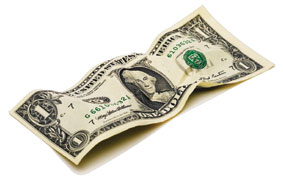   
|
| BUSINESS |
 Bahrain International Bank
Bahrain International Bank
Down to the last dollar
Can Bahrain’s troubled financial giant come back from the brink?
Shareholders in Bahrain International Bank (BIB) have thrown the crisis-stricken bank a lifeline by approving plans for a make-or-break rescue package. An ambitious, $50 million rights issue forms the cornerstone of the package, which also saw the resignation of the longstanding chief executive officer, Robin Mcllvenny.
Shareholders approved the plans at an extraordinary general meeting held in Bahrain on December 14th: without the shareholders’ backing, some analysts feared BIB would have folded on the spot. The proposed rights issue gives the bank breathing space following a disastrous 2002, which ended with BIB on the verge of extinction.
“While shareholders naturally took the opportunity to express dissatisfaction with the bank’s recent performance at today’s meeting, their support for our recovery plan and rights issue will provide BIB with the opportunity to move forward with its restructuring proposals,” said BIB chairman Faisal Al Marzook.
However, while the move provides welcome respite, the bank remains in dire straits, and some observers believe it is merely delaying the inevitable. The bank defaulted on its loan repayments in September 2002 in the face of a mounting liquidity crisis. Since then, creditors have agreed to a standstill on repayments, and the Bahrain Monetary Agency (BMA, the country’s central bank) has offered a $40 million emergency loan. But many fear their patience may be running out.
“I really can’t see a way out of this for BIB,” says one banker who has worked closely with BIB. “Whichever way you value BIB’s assets, it’s difficult to see how they come close to matching its liabilities. There are various technical issues facing term-lenders, which means it has not been in their interest to call in their loans so far. But this cannot go on forever.”
Crash and burn. BIB’s problems stem from losses recorded in international investments over the past three years. The bank, founded in 1982, invested heavily in US and European venture capital and corporate bonds in the late 1990s. The policy worked well during the boom at the end of the last century, and BIB recorded handsome profits. But once the markets crashed in spring 2000, BIB was left with a portfolio of poorly performing assets.
 The bank recorded a loss of $47
million in 2001, and in November 2002 announced further heavy losses and
write-offs, including about $100 million in its corporate bond portfolio.
BIB’s problems escalated in late 2002 when the Internal Revenue Service,
the US tax authority, seized a number of BIB’s US assets over a claimed
$26 million unpaid tax bill. In November, stock exchanges in Bahrain and
Kuwait suspended trading in BIB’s shares in response to the crisis.
The bank recorded a loss of $47
million in 2001, and in November 2002 announced further heavy losses and
write-offs, including about $100 million in its corporate bond portfolio.
BIB’s problems escalated in late 2002 when the Internal Revenue Service,
the US tax authority, seized a number of BIB’s US assets over a claimed
$26 million unpaid tax bill. In November, stock exchanges in Bahrain and
Kuwait suspended trading in BIB’s shares in response to the crisis.
The timing could not have been worse for BIB. Just as its finances became stretched, the threat of war in Iraq began to loom large on the horizon. Many of the international banks that lend money to BIB took fright and refused to renew credit lines, fearing a regional conflict could wipe out their cash. Ratings agencies responded with a string of downgrades, leaving BIB in a desperate position.
Despite these difficulties, BIB chairman Marzook insists the bank can pull through. “Persistent turmoil affecting global capital markets and our current liquidity crisis has severely affected the operations of the bank,” he admitted in November. “However, we [are] committed to restoring the bank to prosperity.” And he remained bullish after the rescue plan was approved in December. “The bank remains in constructive discussions with its creditors and, once we secure their support for our plans, we can begin the process of restoring BIB to financial health.”
Specifically, BIB insists that many of its investments remain healthy. Its British property subsidiary, Crown Dilmun Estates, boasts a portfolio valued at around $140 million. And BIB’s largest single asset, US fast-food operator Carrols, is valued by BIB at a similar price, although some independent assessors value it considerably lower.
Looking forward, Marzook hopes BIB will emerge from the current crisis in a streamlined form, concentrating on two core areas in which it boasts a strong track record: British property investment and corporate finance advice to Gulf companies and governments. Crucially, he says there will be no more forays into the high-risk world of venture capital or high-yield bonds, and a phased exit from these sectors is planned once markets recover – and with them the value of BIB’s holdings.
Reputations. Analysts say that BIB is not beyond salvation. For a start, the BMA is likely to do all it reasonably can to save BIB, as a banking collapse would severely dent Manama’s reputation as the region’s financial hub. Banking is the country’s main industry, so the government is determined to defend its reputation – particularly with Dubai breathing down its neck with the launch of Dubai International Financial Center as a rival to Manama.
However, the BMA knows that propping up a failed bank could do Bahrain’s reputation more harm than good, so there are limits to the support it will extend. Furthermore, creditors will eventually lose patience if signs of recovery are not seen soon – and with international markets still in the doldrums, that may be a distant hope. Finally, the rights issue has still to go ahead.
Shareholders have approved the move in principal, but it remains to be seen if they will put their money where their mouth is and come up with the $30-50 million needed to keep BIB alive. BIB has not yet breathed its last, but it remains on the critical list. It will take a remarkable recovery to nurse BIB back to health.
